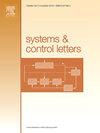多传感器轮循协议下远程状态估计DoS攻击调度
IF 2.5
3区 计算机科学
Q3 AUTOMATION & CONTROL SYSTEMS
引用次数: 0
摘要
本文研究了多传感器多通道网络物理系统中用于远程状态估计的拒绝服务(DoS)攻击的最优调度问题。为了避免数据冲突,只有一个传感器可以接入无线通信信道,并将其数据包传输给远程估计器,远程估计器也可能受到恶意DoS攻击者的拥塞。考虑到攻击者的能量限制,必须在每个时间步决定是否对通信通道发起攻击。本文研究了误差协方差在远程估计器处的固有动态特性,并针对两种情况提出了最优攻击方案:(i)能够实时执行卡尔曼滤波算法的智能传感器,以及(ii)仅限于采集和传输原始测量数据的非智能传感器。最后,通过数值算例对理论结果进行了验证。本文章由计算机程序翻译,如有差异,请以英文原文为准。
DoS attack schedules for remote state estimation under multi-sensor round-robin protocol
In this paper, we investigate the optimal scheduling of denial-of-service (DoS) attacks for remote state estimation in cyber–physical systems with multiple sensors and channels. To avoid data conflicts, only one of the sensors can access the wireless communication channels and transmit its data packets to the remote estimator which may also experience congestion caused by a malicious DoS attacker. Given the energy limitations of the attackers, decisions must be made at each time step about whether to initiate an attack on the communication channels. We obtain an inherent dynamic characteristic of the error covariance at the remote estimator and propose an optimal attack schedule by concentrating on two scenarios: (i) smart sensors that can execute a Kalman filter algorithm in real time, and (ii) non-intelligent sensors that are restricted to collecting and transmitting only raw measurement data. Finally, the theoretical results are illustrated by numerical examples.
求助全文
通过发布文献求助,成功后即可免费获取论文全文。
去求助
来源期刊

Systems & Control Letters
工程技术-运筹学与管理科学
CiteScore
4.60
自引率
3.80%
发文量
144
审稿时长
6 months
期刊介绍:
Founded in 1981 by two of the pre-eminent control theorists, Roger Brockett and Jan Willems, Systems & Control Letters is one of the leading journals in the field of control theory. The aim of the journal is to allow dissemination of relatively concise but highly original contributions whose high initial quality enables a relatively rapid review process. All aspects of the fields of systems and control are covered, especially mathematically-oriented and theoretical papers that have a clear relevance to engineering, physical and biological sciences, and even economics. Application-oriented papers with sophisticated and rigorous mathematical elements are also welcome.
 求助内容:
求助内容: 应助结果提醒方式:
应助结果提醒方式:


